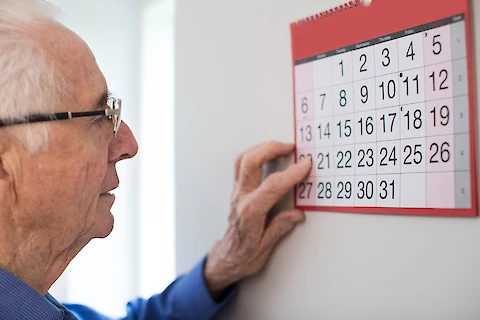
Caring for a senior with dementia can be frustrating and heartbreaking, especially as they begin to lose track of time and days. As a caregiver, it's important to provide support and structure in their environment to help them navigate this difficult aspect of their condition.
Today, we'll explore a variety of ways to make time easier to understand for seniors with dementia. We'll also discuss why it may not be a best practice to constantly correct times and dates, instead focusing on overall well-being. As experts in senior care at Senior Helpers Westchester, we are here to offer guidance and support on this complicated aspect of caregiving.
1. Structure Settings to Make Time More Apparent
One effective way to help seniors with dementia track time and days is to structure their surroundings to highlight the passage of time. A brightly lit environment during the daytime can provide visual cues that it is indeed daytime. This can be achieved by allowing natural sunlight to enter their living area or using artificial lighting to simulate daylight.
In addition to bright lighting, providing visible and easy-to-read clocks throughout their living space can also be helpful. Place these clocks in common areas where the senior can easily see them, like the living room or kitchen. This will help remind seniors of the current time and create a sense of regularity.
Establishing clear schedules and calendars is beneficial for seniors with dementia, as it gives them a sense of routine and familiarity. Create daily routines that involve activities at specific times, like mealtimes, exercise, and socialization. Use large-print calendars that are easily visible and understandable, making sure to regularly update and review the schedules with the senior.
2. Use Subtle Environmental Cues
Apart from structuring settings, incorporating low-key environmental cues into their daily life can also be useful in helping seniors with dementia keep track of time. One way to do this is through music and sounds. Play upbeat tunes or morning-themed songs during the day and switch to calming, relaxing sounds at night. This can provide auditory cues that signal the time of day and create a comforting atmosphere.
Visual cues, such as displaying pictures of daytime activities or incorporating nighttime-themed decorations, can also help seniors with dementia keep track of their daily rhythms. These visual cues help reinforce the concepts of day and night, which can be especially helpful for seniors who may spend a lot of time indoors.
3. Hold Off on Correcting Seniors
While helping a senior with dementia track time and days is important, avoid being overly insistent on correcting their perception of the time or date. Doing so can lead to increased confusion and agitation, resulting in a more challenging caregiving experience. In some cases, insisting on constant corrections can harm the senior's overall well-being.
Instead of focusing on exact times and dates, prioritize their comfort and happiness. By creating a structured environment with softer cues, you'll be helping them naturally recognize the passage of time without causing unnecessary distress.
We're Here to Help
Helping seniors with dementia track time and days involves a delicate balance of structuring their environment and providing softer cues that are easy to digest. Creating a comforting and supportive environment with clear schedules, visible clocks, and calming cues can significantly improve the quality of life for both the senior and their caregiver.
If you live in Mount Vernon, Yonkers, New Rochelle, Tarrytown, or Bronxville and need professional in-home caregiving for a loved one with dementia, contact us at Senior Helpers Westchester today for compassionate and knowledgeable assistance.